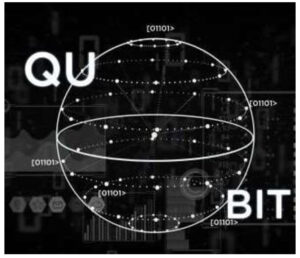~ GUNAVANTH MAHENDRA
Quantum Computing promises to take us to the next stage of human evolution and with unfathomable speeds and processing power, quantum computers look to be a very promising prospect for the future. But first, let’s see what a quantum computer is and how it differs from a classical computer that we use now.
Quantum computers manipulate quantum mechanical phenomena to handle information, process data and perform tasks; whereas classical computers apply the fact that an electrical circuit can only be in one state at one point of time to go about their tasks. Classical computers use bits or binary digits to do their tasks. A bit is the basic unit of information in computing, it represents a logical state with one of 2 possible values: 1 or 0. Therefore by definition, a bit can have only one possible value at a time.
Quantum computers, on the other hand, rely on quantum bits, or qubits to perform tasks. A qubit can be in a coherent superposition of the two states simultaneously i.e. it can have more than 1 possible value at any given time. This means that a qubit can hold at least as much or more than double the amount of information that a bit can hold.
So how does this make a difference?
Firstly, quantum computers can do a lot more work than a normal computer can as they use qubits that can store more data in them. Quantum computers are also more efficient and can solve problems that would take classical computers a lifetime, in a matter of mere seconds. This has huge implications, it means that we will be able to process more substantial amounts of data, at a much faster rate and more efficiently than ever before.
Applications:
Big Data: Over the past few years, humans have become incredibly efficient in gathering huge amounts of data. Every day we produce at least 2.5 exabytes of data or roughly content that’s stored in about 5 million laptops, but this data remains largely unprocessed and is discarded after a certain amount of time as current computational techniques aren’t advanced enough to deal with such large quantities of data. Quantum computing promises to change all of this.
Quantum computers can potentially be hundreds of millions of times faster than any existing computers that we have right now, enabling us to manipulate obscure amounts of data with relative ease.
 With so much of data to manipulate, these machines would help us create better predictive models and gauge risks better to an extent none of us would’ve thought is possible. They can help us find answers to complex questions like “what is at the centre of a black hole” or even help us find a potential ‘theory of everything’ using advanced predictive models that are impossible to create now. If big data is the future, then quantum computing is the future of big data.
With so much of data to manipulate, these machines would help us create better predictive models and gauge risks better to an extent none of us would’ve thought is possible. They can help us find answers to complex questions like “what is at the centre of a black hole” or even help us find a potential ‘theory of everything’ using advanced predictive models that are impossible to create now. If big data is the future, then quantum computing is the future of big data.
 As efficient use of artificial intelligence and thereby machine learning and the Internet of Things finds its roots in big data, any significant improvement in the way we store and analyse data will naturally have an impact on how well our AI and Machine learning functions. Artificial Intelligence systems heavily rely on data analysis and the learning is essentially done by finding patterns and regularities in large data sets. AI technologies have been advancing rapidly, but their full ability is yet to be understood as computers that we have now cannot handle the volume of data that we can generate within a realistic timeline. Quantum computers intend to revolutionise the industry of AI, Machine Learning, and IoT. The future looks to be very promising.
As efficient use of artificial intelligence and thereby machine learning and the Internet of Things finds its roots in big data, any significant improvement in the way we store and analyse data will naturally have an impact on how well our AI and Machine learning functions. Artificial Intelligence systems heavily rely on data analysis and the learning is essentially done by finding patterns and regularities in large data sets. AI technologies have been advancing rapidly, but their full ability is yet to be understood as computers that we have now cannot handle the volume of data that we can generate within a realistic timeline. Quantum computers intend to revolutionise the industry of AI, Machine Learning, and IoT. The future looks to be very promising.
Enhanced Data Security:
 Modern-day SSL or RSA encryption works by generation of an encrypted key that’s nearly impossible to crack and then uses this key to send messages or data across. The person on the receiving end will receive the data as only he/she will have the key, anyone who intercepts the data in between will only see a string of meaningless characters that wouldn’t make any sense unless you have the key. These methods rely on prime number factorisation to protect data. Our data is secured by the fact that it’s much harder to factor out large prime numbers than it is to multiply them together. Classical computers would take millions if not billions of years to factor out the encryption locks that we have today, as prime factoring is a one – way function; a mathematical operation that’s easy to figure out in one direction but very difficult to reverse.
Modern-day SSL or RSA encryption works by generation of an encrypted key that’s nearly impossible to crack and then uses this key to send messages or data across. The person on the receiving end will receive the data as only he/she will have the key, anyone who intercepts the data in between will only see a string of meaningless characters that wouldn’t make any sense unless you have the key. These methods rely on prime number factorisation to protect data. Our data is secured by the fact that it’s much harder to factor out large prime numbers than it is to multiply them together. Classical computers would take millions if not billions of years to factor out the encryption locks that we have today, as prime factoring is a one – way function; a mathematical operation that’s easy to figure out in one direction but very difficult to reverse.
 Quantum computers would be able to decrypt modern keys in a matter of mere seconds as information can be stored and processed in multiple states at any given point of time. Working on a quantum computer would be like having multiple classical computers doing the same work for you, essentially reducing the time required to crack these codes that keep all our data safe to a matter of mere seconds. To overcome this, we will have to come up with more advanced, quantum-proof encryption methods that will make our data more secure than ever before.
Quantum computers would be able to decrypt modern keys in a matter of mere seconds as information can be stored and processed in multiple states at any given point of time. Working on a quantum computer would be like having multiple classical computers doing the same work for you, essentially reducing the time required to crack these codes that keep all our data safe to a matter of mere seconds. To overcome this, we will have to come up with more advanced, quantum-proof encryption methods that will make our data more secure than ever before.
Applications in Finance: Quantum computing with its significantly higher processing power and speeds, will improve all domains that rely on computational techniques significantly; the financial world is no exception to this. Promising to offer enhanced blockchain capabilities, a much faster and greater volume of transactions, and application of the aforementioned capabilities into tasks to make them more efficient. Let us delve into a couple of instances wherein quantum technology can be beneficial to the financial world.
Better customer relations: In retail banking and insurance, customer relationship management can be strengthened by the automation of more specifically tailored services. Quantum can offer better precision in simulating consumer buying behaviours based on personal data, whether it is a new insurance policy or a mortgage. Customer confidential information, moreover, can be more easily secured by synchronised monitoring and review of pending hazards, predicting and systematically protecting against assaults. Quantum computing may be a game-changer for consumer targeting and forecast processing. A quantum computer’s ability to create far more detailed and efficient data models enable it to better gauge patterns and make predictions that are classical computers cannot due to their limited functionality and the ever-increasing complexity of data sets.
Trading Optimisation: Financial Markets and trading activities are becoming increasingly complex; computers and algorithms are now able to easily execute thousands of trades per second. With the ever-increasing complexity and a call for stricter norms and more transparent transactions, investment managers struggle to incorporate parameters such as market volatility, consumer behaviour and market trends into portfolio optimisation using modern computational methods. In an ideal world, fund managers would like to incorporate as much data as possible into predicting market movements, market trends and investor sentiment to better gauge expected returns.
Quantum technology would help institutions and managers to better navigate through the ever-increasing complexities of our evolving financial world by enabling improved portfolio diversification methods, better portfolio rebalancing, and enhanced high-frequency trading to more precisely respond to investor demands in more cost-efficient ways.
With such great promise of faster speeds and exponentially better computational techniques, quantum computing looks to improve the world that we live in right now by making it more efficient and reliable. Even though the technology is still in its infancy, the quantum computers that we have been able to build to date are approximately 1.5 trillion times faster than the computers that we use today. With greater advancement and more research, quantum computers must only continue to improve. Quantum computing is going to be the revolutionary technology that will lead mankind into the next stage of evolution.
About the Author:
Gunavanth is in the second year at IAQS. He loves to solve analytical problems and economics. In his free time, he plays football and is currently interning at Deloitte.
References:
https://bernardmarr.com/default.asp?contentID=1193
https://medium.com/@Intetics/how-quantum-computing-will-boost-the-value-of-big-data-bccb95fb352b
https://isg-one.com/consulting/articles/quantum-computing-and-the-future-of-big-data
https://atos.net/wp-content/uploads/2018/05/Atos-Quantum-FS-white-paper.pdf
https://www.ibm.com/thought-leadership/institute-business-value/report/exploring-quantum-financial#






